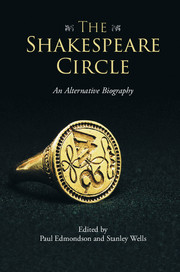Book contents
- Frontmatter
- Contents
- List of illustrations
- List of contributors
- Preface and acknowledgements
- General introduction
- Part I Family
- Part II Friends and Neighbours
- Part III Colleagues and Patrons
- 18 His fellow dramatists and early collaborators
- 19 His theatre friends: the Burbages
- 20 His fellow actors Will Kemp, Robert Armin and other members of the Lord Chamberlain's Men and the King's Men
- 21 His literary patrons
- 22 His collaborator George Wilkins
- 23 His collaborator Thomas Middleton
- 24 His collaborator John Fletcher
- 25 His editors John Heminges and Henry Condell
- Closing remarks
- Afterword
- Index
- References
22 - His collaborator George Wilkins
from Part III - Colleagues and Patrons
Published online by Cambridge University Press: 05 November 2015
- Frontmatter
- Contents
- List of illustrations
- List of contributors
- Preface and acknowledgements
- General introduction
- Part I Family
- Part II Friends and Neighbours
- Part III Colleagues and Patrons
- 18 His fellow dramatists and early collaborators
- 19 His theatre friends: the Burbages
- 20 His fellow actors Will Kemp, Robert Armin and other members of the Lord Chamberlain's Men and the King's Men
- 21 His literary patrons
- 22 His collaborator George Wilkins
- 23 His collaborator Thomas Middleton
- 24 His collaborator John Fletcher
- 25 His editors John Heminges and Henry Condell
- Closing remarks
- Afterword
- Index
- References
Summary
George Wilkins is remembered today largely for two reasons – for co-writing Pericles with Shakespeare and for running a tavern or bawdy house. Neither activity has enhanced his reputation. By all accounts, he was an unlikeable figure, a man evidently given to violent outbursts and physical attacks against women. Critics have kept their distance from him and wished that Shakespeare might have done so too. Neither W. W. Greg's edition in collotype facsimile of Pericles, nor his later study of editorial questions in Shakespeare, so much as mentions Wilkins by name (Greg 1940, 1956). G. E. Bentley's The Jacobean and Caroline Stage ignored him as a dramatist altogether (Bentley 1956), as did Derek Traversi's short catalogue of Renaissance drama (Traversi 1980). Biographers of Shakespeare have found his association with Wilkins unfortunate. Park Honan deems Shakespeare ‘not to be blamed’ for this particular association (Honan 1999, p. 329). For Katherine Duncan-Jones, Wilkins was a misogynistic lout, a ‘distinctly second-rate, though by no means talentless writer’ (Duncan-Jones 2001, pp. 205–6). Peter Ackroyd wonders why Shakespeare ‘would condescend to work with a tyro’ (Ackroyd 2006, p. 434), while René Weis silently passes over any and all of Wilkins's literary contributions (Weis 2007). Charles Nicholl, who devotes three useful chapters to Wilkins, nevertheless thinks him ‘a mediocre writer’ (Nicholl 2008, p. 199). What we now know of Wilkins's character fits uncomfortably with what we suppose we know of ‘sweet Shakespeare’, ‘good Will’, or ‘Friendly Shakespeare’, terms used by contemporaries William Covell, John Davies of Hereford and Anthony Scoloker. Wilkins is something of an anomaly, a dreadful man but a writer who ought to be of considerable interest, for Wilkins clearly knew the red-light world of bawds, panders and prostitutes that also lies at the heart of the play they both produced.
Most of what we know about the life of George Wilkins has emerged through prosecutions of him that have survived in the Middlesex County Sessions records (Prior 1972 and 1976). He was an aspiring writer whose extant work seems to have emerged from the two-year period between 1606 and 1608. His father apparently died in the dreadful London plague of summer 1603: sixth in the list of burials for 19 August 1603 in the register of St Leonard's, Shoreditch, is ‘George Wilkins the Poet’ of Holywell Street.
- Type
- Chapter
- Information
- The Shakespeare CircleAn Alternative Biography, pp. 289 - 296Publisher: Cambridge University PressPrint publication year: 2015
References
- 1
- Cited by

